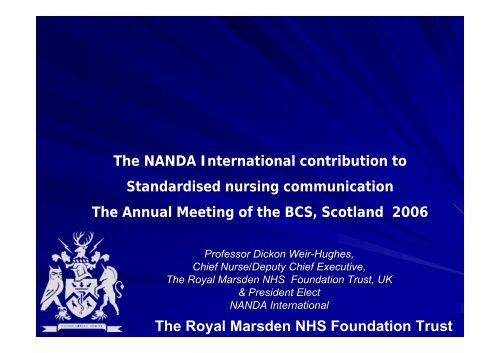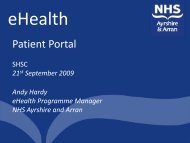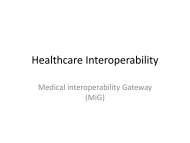The Royal Marsden NHS Foundation Trust - BCS - Health Scotland
The Royal Marsden NHS Foundation Trust - BCS - Health Scotland
The Royal Marsden NHS Foundation Trust - BCS - Health Scotland
You also want an ePaper? Increase the reach of your titles
YUMPU automatically turns print PDFs into web optimized ePapers that Google loves.
<strong>The</strong> NANDA International contribution toStandardised nursing communication<strong>The</strong> Annual Meeting of the <strong>BCS</strong>, <strong>Scotland</strong> 2006Professor Dickon Weir-Hughes,Chief Nurse/Deputy Chief Executive,<strong>The</strong> <strong>Royal</strong> <strong>Marsden</strong> <strong>NHS</strong> <strong>Foundation</strong> <strong>Trust</strong>, UK& President ElectNANDA International<strong>The</strong> <strong>Royal</strong> <strong>Marsden</strong> <strong>NHS</strong> <strong>Foundation</strong> <strong>Trust</strong>
Objectives for todayExplore the concept of NursingDiagnosis and their development andapplicationA brief overview of NANDA InternationalNANDA International vision for the futureTrans-cultural challengesAnswer questions<strong>The</strong> <strong>Royal</strong> <strong>Marsden</strong> <strong>NHS</strong> <strong>Foundation</strong> <strong>Trust</strong>
NANDA InternationalNANDA International was formed as the NorthAmerican Nursing Diagnosis Association in theUSA in the 1970’s. It became NANDA-I I in 2002to reflect a growing international interest innursing language development. NANDA wasdeveloped by a group of leading nurse theoristsat the first conference on classification of nursingin 1973.NANDA has collaborative links with ACENDIO,AENTDE, AFIDI, JSND and other regionalgroups.<strong>The</strong> <strong>Royal</strong> <strong>Marsden</strong> <strong>NHS</strong> <strong>Foundation</strong> <strong>Trust</strong>
NANDA-INANDA-I I is nurse member led and theleadership are selected by election.NANDA-I I provides a number of productsbut is best known for its’ evidence-basedclassification of Nursing Diagnoses foruse in practice and to determineinterventions and outcomes.<strong>The</strong> <strong>Royal</strong> <strong>Marsden</strong> <strong>NHS</strong> <strong>Foundation</strong> <strong>Trust</strong>
NANDA-I I produces the NANDAclassification every two years. This is anevidence-based classification of nursingterms and is translated into languagesincluding:-• Chinese• Danish• Dutch• English (British)• French• German• Icelandic• Italian• Japanese• Norwegian• Portugese• Spanish<strong>The</strong> <strong>Royal</strong> <strong>Marsden</strong> <strong>NHS</strong> <strong>Foundation</strong> <strong>Trust</strong>
NANDA–I I is managed by a Board ofDirectors and a number of committeesincluding a Diagnostic ReviewCommittee, Informatics Committee andTaxonomy Committee.<strong>The</strong> way that NANDA-I I is managed andgoverned was under review in order tomake the organisation moreinternationally accountable andapplicable. <strong>The</strong>se new arrangementscome into force in 2008<strong>The</strong> <strong>Royal</strong> <strong>Marsden</strong> <strong>NHS</strong> <strong>Foundation</strong> <strong>Trust</strong>
<strong>The</strong>re are three European Directors on theNANDA Board. One from Norway, one fromWales and the President-Elect from the UK.Professor Weir-Hughes was the first non-USAbased elected Director and will be the first non-USA based President from 2008 – 2010.<strong>The</strong> values and beliefs of nurses and thehumanistic philosophy of nursing transcendsnational and cultural boundaries. Whilst valuingdifferent cultures and cultural approaches tonursing it is now more important than ever thatnurses work together worldwide and actively seekareas of common understanding.<strong>The</strong> <strong>Royal</strong> <strong>Marsden</strong> <strong>NHS</strong> <strong>Foundation</strong> <strong>Trust</strong>
Nursing DiagnosisNursing Diagnosis is a clinical judgmentabout individual, family or communityresponses to actual or potential healthproblems / life processes. NursingDiagnoses provide the basis for theselection of nursing interventions toachieve the outcomes for which the nurseis accountableShoemaker, J 1984 (NANDA DelphiStudy)<strong>The</strong> <strong>Royal</strong> <strong>Marsden</strong> <strong>NHS</strong> <strong>Foundation</strong> <strong>Trust</strong>
Benefits of Using NursingDiagnosisConsistencyVisibilityEfficiency<strong>The</strong> <strong>Royal</strong> <strong>Marsden</strong> <strong>NHS</strong> <strong>Foundation</strong> <strong>Trust</strong>
WHY?If you can’t t name it, you can’tcontrol it, finance it, teach it, or putit into public policy.(Lang 1993:9)<strong>The</strong> <strong>Royal</strong> <strong>Marsden</strong> <strong>NHS</strong> <strong>Foundation</strong> <strong>Trust</strong>
WHY?Risk ManagementEvidence based careProvides research base for nursingEfficiencyCommunicationElectronic patient record facilitationAudit and evaluation<strong>The</strong> <strong>Royal</strong> <strong>Marsden</strong> <strong>NHS</strong> <strong>Foundation</strong> <strong>Trust</strong>
How a Nursing Diagnosis isStructured…Label : Acute painDefinition : An unpleasant sensory and emotionalexperience associated with actual or potential tissuedamage; sudden or slow onset of any intensity from mildto severe with an anticipated or predictable end and aduration of less than six monthsDefining characteristics– <strong>The</strong> patient states they have pain:– Observed evidence– Protective behaviour– Sleep disturbanceRelated Factors:– Injury agents: biological chemical physicalpsychological<strong>The</strong> <strong>Royal</strong> <strong>Marsden</strong> <strong>NHS</strong> <strong>Foundation</strong> <strong>Trust</strong>
Research and Nursing Diagnosis<strong>The</strong> Diagnostic Review Committee arerigorous about examining the source of eachproposed diagnosis.<strong>The</strong> research methods used include: expertconsensus, concept analysis and criterionvalidation<strong>The</strong> level of research evidence is indicated byeach diagnosis listed in the classification.Our challenges include lack of large scalefunding, lack of expertise in concept analysisand all of the challenges faced by all memberled nursing groups.<strong>The</strong> <strong>Royal</strong> <strong>Marsden</strong> <strong>NHS</strong> <strong>Foundation</strong> <strong>Trust</strong>
Common Criticisms ofNursing DiagnosisLanguage is not very user friendlyDistracts from Individualized PatientCareClosely Linked to the Medical ModelNot patient friendly reducing thepotential for patient participation in careIt is sometimes viewed as reductionist(but interestingly not by many experts inholistic nursing and holism generally)<strong>The</strong> <strong>Royal</strong> <strong>Marsden</strong> <strong>NHS</strong> <strong>Foundation</strong> <strong>Trust</strong>
As example of an assessment structure is Functional <strong>Health</strong>Patterns (Gordon, 1994)<strong>Health</strong> Perception - <strong>Health</strong> ManagementActivity - ExerciseCognitive - PerceptualCoping - Stress toleranceEliminationNutrition - MetabolicRole - RelationshipSelf Perception - Self ConceptSexuality - ReproductionSleep - RestValue – BeliefGordon’s Functional <strong>Health</strong> Patterns provide an excellent way ofassessing in a structured manner. Gordon’s structure is not anursing theory or model, so many nurse leaders and nurses findit useful as it does not confuse the issue of nursing theory withassessment.<strong>The</strong> <strong>Royal</strong> <strong>Marsden</strong> <strong>NHS</strong> <strong>Foundation</strong> <strong>Trust</strong>
America versus Europe!Patients are patients!Nursing transcends numerous culturalboundaries, but it is recognised thatthere are key differences<strong>The</strong> NANDA Classification wasoriginally developed in the USA and wemust thank those original developers. Itis now time for nurses world wide tocontribute and to engage, recognisingthat standardised nursing language isessential for informatics.<strong>The</strong> <strong>Royal</strong> <strong>Marsden</strong> <strong>NHS</strong> <strong>Foundation</strong> <strong>Trust</strong>
Trans-cultural issues and NANDAInternational: ConceptualDifferences• For example “Fatigue” (France)• “Anticipatory Grieving” (Numerouscountries)• “Family Process” (Japan)• “Religiosity” (USA)• “Energy Field Disturbance” (UK)Nursing challenges in a multiculturalsociety, especially in large cities in thedeveloped world<strong>The</strong> <strong>Royal</strong> <strong>Marsden</strong> <strong>NHS</strong> <strong>Foundation</strong> <strong>Trust</strong>
NANDA International is aMembership Organisation• We welcome your contributions as members• We especially welcome suggestions for new orrevised Nursing Diagnoses. <strong>The</strong>se can besubmitted in any language and can be culturally orcountry specific. Submission details can be found atwww.nanda.org• Your contributions will help to make NANDA amore culturally sensitive organisation and theNANDA classification an internationally useable toolfor improving nursing practice<strong>The</strong> <strong>Royal</strong> <strong>Marsden</strong> <strong>NHS</strong> <strong>Foundation</strong> <strong>Trust</strong>
<strong>The</strong> future…Nursing Diagnosis will becomeincreasingly important worldwide, apartfrom anything else because it isfundamental to electronic patient records.It is important that we (nurses)understand nursing science and that weverbalise our phenomena of concern andour understanding of our work in aconsistent and cohesive manner. NursingDiagnosis enables us.<strong>The</strong> <strong>Royal</strong> <strong>Marsden</strong> <strong>NHS</strong> <strong>Foundation</strong> <strong>Trust</strong>
<strong>The</strong> future…Please join me in taking forward thescience of nursing through thestudy and use of Nursing Diagnosisfor the benefit of patients presentand future!<strong>The</strong> <strong>Royal</strong> <strong>Marsden</strong> <strong>NHS</strong> <strong>Foundation</strong> <strong>Trust</strong>
Questions and Answers<strong>The</strong> <strong>Royal</strong> <strong>Marsden</strong> <strong>NHS</strong> <strong>Foundation</strong> <strong>Trust</strong>
Thank you for listeningProf. Dickon Weir-Hughes,Chief Nurse/Deputy Chief Executive,<strong>The</strong> <strong>Royal</strong> <strong>Marsden</strong> Hospital,Fulham Road,LONDON SW3 6JJ, U.K.Tel: + 44 20 7808 2121Fax: + 44 20 7808 2206e-mail:dickon.weir.weir-hughes@rmh.nhs.ukwww.nandananda.org<strong>The</strong> <strong>Royal</strong> <strong>Marsden</strong> <strong>NHS</strong> <strong>Foundation</strong> <strong>Trust</strong>





